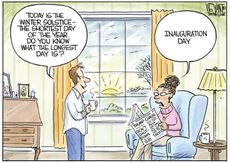Want to stop sexual abuse in the workplace? Make sure every company has an HR department.
Victims need an established institutional means of reporting bad behavior to an ostensibly neutral, bureaucratic entity


If you want to expose and punish past acts of workplace sexual harassment and predation, there's nothing more effective than journalists talking to women about their experiences with an alleged abuser, verifying their claims, and publishing them. This humiliates the perpetrator, badly damaging or destroying his reputation, and in many cases scuttling his career. And the bad press (especially when combined with numerous other stories) may also serve to deter future bad behavior on the part of other powerful men.
Both considerations — retribution over the past, deterrence for the future — are playing a decisive role in driving the stories that have taken down a slew of men in recent weeks and that threaten to take down many, many more in the days, weeks, and months ahead.
But that doesn't mean that it's enough for reformers to rely on the informal deterrence that follows from the threat of bad press. Some abusers aren't famous enough to justify a splashy news story. Then there's the possibility that the sheer volume of claims will eventually rob them of their ability to influence opinion about the perpetrators.
Subscribe to The Week
Escape your echo chamber. Get the facts behind the news, plus analysis from multiple perspectives.

Sign up for The Week's Free Newsletters
From our morning news briefing to a weekly Good News Newsletter, get the best of The Week delivered directly to your inbox.
From our morning news briefing to a weekly Good News Newsletter, get the best of The Week delivered directly to your inbox.
That's why reform needs to take a different, less ostentatious form. Want to protect people against predators in the workplace? Make sure every company in America has a department of human resources.
Readers with experience in the corporate world will likely find the suggestion laughably banal. That's because it was way back in the 1990s that most corporations first tasked HR departments with overseeing sexual harassment claims. This doesn't mean that sexual manipulation and predation doesn't still take place in the corporate sector. But it does mean that in most cases its victims have an established institutional means of reporting the behavior to an ostensibly neutral, bureaucratic entity tasked with solving interpersonal problems and avoiding lawsuits.
Are departments of human resources perfect solutions to the problem of workplace sexual misconduct? Of course not. But victims are indisputably better off with them than without them.
That's certainly the impression one gets from reading the sordid tales of sexual harassment at media companies — especially upstart ones. As Laura McGann notes in her Vox story about the allegedly inappropriate sexual behavior of The New York Times' Glenn Thrush during his time working at Politico, "there was no conventional HR office" at one of the most influential news outlets covering the nation's capital. McGann goes on to explain that it wasn't until 2016 that "a VP of human resources position was created" at Politico.
The absence of an HR department has also played a significant part in stories about Leon Wieseltier's alleged pattern of appalling behavior toward female staffers at The New Republic. When Seyward Darby mildly objected to Wieseltier sending her a file titled "foreskin," his response was to proclaim sarcastically, "Oh, report me to HR!" But of course that was impossible, because as former TNR editor Franklin Foer recently explained in an interview, the magazine had no such office: "There was this sense that it was too poor to afford one."
TNR in that era certainly was starved for cash. But then again, judgments about exactly what a magazine that perennially loses money can afford to spend its limited resources on are always a question of priorities — and clearly the decision-makers at the magazine (Wieseltier and then-owner Marty Peretz) preferred to run the place like their personal fiefdom, with no bureaucratic oversight or enforcement of workplace norms at all.
Obviously the same was true at Harvey Weinstein's movie production companies, which he owned and ran however he saw fit, without constraint, and in the hotel rooms where Louis C.K. would strip naked and masturbate in front of female comedians.
The pattern is clear: When a certain kind of sexually insatiable and entitled man is given something close to absolute power, he will abuse it — and the women (and sometimes men) around him — for the sake of his own gratification.
No one who studies human history or the political philosophy behind the American system of government, with its multiple overlapping forms of oversight and checks on power, should be surprised. What the Constitution does for the country is roughly equivalent to what HR departments do for the workplace — serve as an institutional structure to constrain, disperse, and limit power.
Play by established rules that apply equally to all employees, treat colleagues with dignity and respect, and refrain from manipulating them into trading sexual favors for advancement or protection — those are the minimum requirements for a non-toxic workplace. And HR departments can do more than any other single thing to ensure that those minimum requirements are upheld.
Sign up for Today's Best Articles in your inbox
A free daily email with the biggest news stories of the day – and the best features from TheWeek.com
Damon Linker is a senior correspondent at TheWeek.com. He is also a former contributing editor at The New Republic and the author of The Theocons and The Religious Test.
-
 Today's political cartoons - December 22, 2024
Today's political cartoons - December 22, 2024Cartoons Sunday's cartoons - the long and short of it, trigger finger, and more
By The Week US Published
-
 5 hilariously spirited cartoons about the spirit of Christmas
5 hilariously spirited cartoons about the spirit of ChristmasCartoons Artists take on excuses, pardons, and more
By The Week US Published
-
 Inside the house of Assad
Inside the house of AssadThe Explainer Bashar al-Assad and his father, Hafez, ruled Syria for more than half a century but how did one family achieve and maintain power?
By The Week UK Published